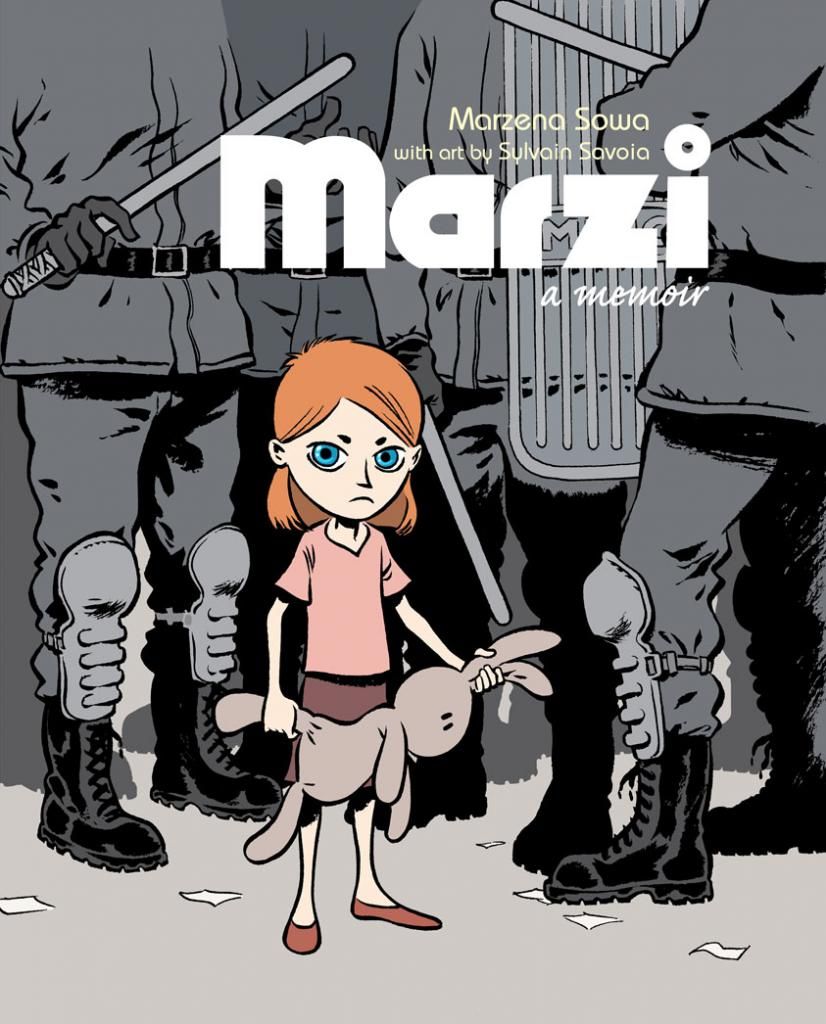Sorry about the late post folks, had some personal drama last night which left me too mentally exhausted to think straight enough to write a review, think I'd better try to build up a buffer of reviews again considering how often this seems to be happening lately. As for the book, is it just me or are about a third of all comic books found in libraries memoirs? I feel like if you were to look at all comics out there they would make up a much smaller percentage of total comic books but libraries just really love their comic books that they can pass off as education I guess? I do know more about Communist Poland than when I started reading this, but really that's more commentary on how the American History/Social Studies classes work (ie, if you get past the Civil War in American or World History you've got a pretty speedy and awesome teacher) than commentary on how good this story was per say.
Marzi: A Memoir by Marzena Sowa and illustrated by Sylvain Savoia
Summary: Marzi was born in communist Poland and while many parts of her childhood are reminiscent of the lives of children worldwide there were many aspects of her life where the Soviet Union's isolation affected her and even from a young age she noticed the rumblings of unhappiness in all the adults around her.
The Good: Sowa was thankfully an interesting child and it seems a very observant one, she manages to easily convey the anxiety and frustrations of the adults around while talking about her own experiences. I had been a bit worried about how well the story would be able to blend the two parts since Sowa is a decade too young to be really involved in any strikes or marches but instead the story proves to be a great example of why it's so crucial to establish your setting, it affects literally every part of your characters' lives.
The Bad: I did have a bit of a hard time following the flow of time in this book, I think it's all chronological but a lack of any solid dates, the differences between Sowa's childhood and mine (ie, if it had been an American child I could have drawn clues from what was going on in their lives but couldn't really do so here), plus the very human characters (ie, who change very slowly and sometimes erratically) left me feeling a bit lost about the order of things (heck, that erractic character growth could have been because the story was out of order, I simply would have liked a few dates so I could keep everything straight). I also felt like the story ended in a weird place, did they suddenly realize they had hit their page count? Did nothing else noteworthy happen in Sowa's childhood? I can sort of see why the story ended where it did, with Sowa having discovered the magic of storytelling (which would then make it all thematic and a bit meta) but overall there were just a few odd problems with the flow of the story.
The Art: I was a bit surprised when looking back through the book but there is a noticeable difference between the first few pages and the last few, I used to books done by professional illustrators who have gotten past that point early in their art where they improve rapidly. In any case, the art is more complex than it first appears, the backgrounds have a fair amount of detail, the characters look distinct, and I think the rather flat, biege color scheme prevalent throughout, without any highlights or shadows, fits the mood well here. I am a bit confused why Sowa has bright orange hair here yet dark hair in the photos at the end but, thinking about what I just said, perhaps that was so she would stand out even more from the beige scenery, that would make a lot of sense.
So, a solid 3 out of 5 stars and, while I have no desire to own or reread this book I am a bit more interested in communist Eastern Europe after World War II and would certainly recommend this to people who have read other comic memoirs and enjoyed them.
